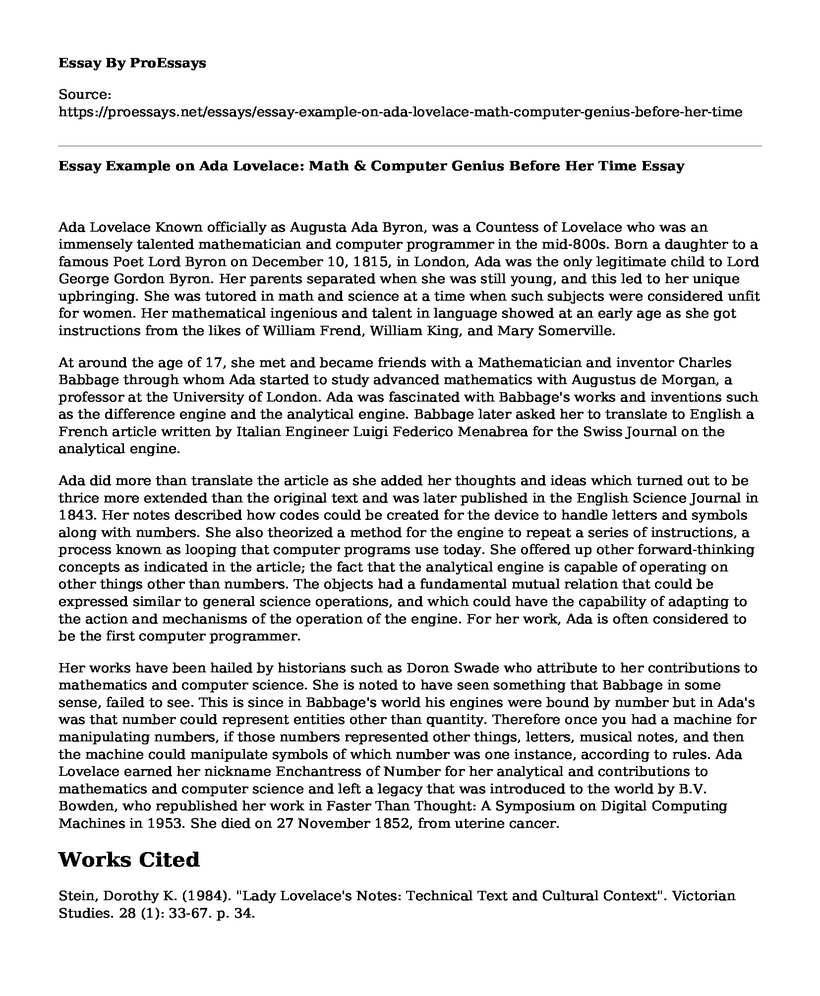Ada Lovelace Known officially as Augusta Ada Byron, was a Countess of Lovelace who was an immensely talented mathematician and computer programmer in the mid-800s. Born a daughter to a famous Poet Lord Byron on December 10, 1815, in London, Ada was the only legitimate child to Lord George Gordon Byron. Her parents separated when she was still young, and this led to her unique upbringing. She was tutored in math and science at a time when such subjects were considered unfit for women. Her mathematical ingenious and talent in language showed at an early age as she got instructions from the likes of William Frend, William King, and Mary Somerville.
At around the age of 17, she met and became friends with a Mathematician and inventor Charles Babbage through whom Ada started to study advanced mathematics with Augustus de Morgan, a professor at the University of London. Ada was fascinated with Babbage's works and inventions such as the difference engine and the analytical engine. Babbage later asked her to translate to English a French article written by Italian Engineer Luigi Federico Menabrea for the Swiss Journal on the analytical engine.
Ada did more than translate the article as she added her thoughts and ideas which turned out to be thrice more extended than the original text and was later published in the English Science Journal in 1843. Her notes described how codes could be created for the device to handle letters and symbols along with numbers. She also theorized a method for the engine to repeat a series of instructions, a process known as looping that computer programs use today. She offered up other forward-thinking concepts as indicated in the article; the fact that the analytical engine is capable of operating on other things other than numbers. The objects had a fundamental mutual relation that could be expressed similar to general science operations, and which could have the capability of adapting to the action and mechanisms of the operation of the engine. For her work, Ada is often considered to be the first computer programmer.
Her works have been hailed by historians such as Doron Swade who attribute to her contributions to mathematics and computer science. She is noted to have seen something that Babbage in some sense, failed to see. This is since in Babbage's world his engines were bound by number but in Ada's was that number could represent entities other than quantity. Therefore once you had a machine for manipulating numbers, if those numbers represented other things, letters, musical notes, and then the machine could manipulate symbols of which number was one instance, according to rules. Ada Lovelace earned her nickname Enchantress of Number for her analytical and contributions to mathematics and computer science and left a legacy that was introduced to the world by B.V. Bowden, who republished her work in Faster Than Thought: A Symposium on Digital Computing Machines in 1953. She died on 27 November 1852, from uterine cancer.
Works Cited
Stein, Dorothy K. (1984). "Lady Lovelace's Notes: Technical Text and Cultural Context". Victorian Studies. 28 (1): 33-67. p. 34.
Swade, Doron (12 May 2008). Charles Babbage and Difference Engine No. 2(Speech). Talks at Google. Mountain View, CA: Talks at Google via YouTube. Retrieved 29 November 2018.
Cite this page
Essay Example on Ada Lovelace: Math & Computer Genius Before Her Time. (2023, Jan 13). Retrieved from https://proessays.net/essays/essay-example-on-ada-lovelace-math-computer-genius-before-her-time
If you are the original author of this essay and no longer wish to have it published on the ProEssays website, please click below to request its removal:
- World Without Mind by Franklin Foer Essay Example
- Essay on Programmability - Program or Be Programmed
- The Spokane Reservation: Sherman Alexie's Poignant Stories of Native American Struggles
- Essay on Hitler's Appointment: The Dawn of Non-Democratic Rule in Germany
- Iraq War: US Armed Conflict 2003-2011 - Essay Sample
- Essay Example on the Lives of Marcus Garvey and Martin Luther King
- Paper Example on Rousseau's Ideas Impact French Revolution: Declaration of Rights of Man







